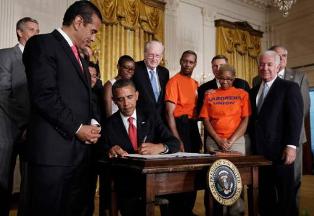
More than two years have passed since the Deepwater Horizon explosion and BP oil spill disaster in the Gulf Coast. The incident led to the death of 11 workers, and additionally devastated the surrounding environment and economy, and poses ongoing challenges to the Gulf’s workforce.
Since the disaster, Gulf States have struggled under the economic troubles this event produced. Gulf Coast advocates and lawmakers have pushed for some form of compensation for the victims of this disaster. On June 29th, the Resources and Ecosystems Sustainability, Tourism Opportunities and Revived Economy (RESTORE) Act was finally passed as part of the Transportation bill. Likewise on July 6th, President Barack Obama signed the RESTORE Act into law. With the passage of this bill, economic and environmental health may be finally brought to the Gulf Coast. Under the law, 80% of Clean Water Act fines from the disaster will be used to “restore the coastal ecosystem and its economies that were damaged by the BP oil spill.” The Act divides the funds among a Gulf Coast Restoration Trust Fund shared among the 5 Gulf States (35%), a Federal-State Gulf Coast Ecosystem Restoration Council (60%), and Centers of Excellence (5%) focused on key disciplines including wetland restoration and sustainable development. The funds will go directly to the communities devastated by the spill. In all, the total monetary payment is estimated to be between $5-20 billion, to be dispersed between Louisiana, Mississippi, Texas, Florida, and Alabama. With money being appropriately dispersed, state and federal decision makers can work with local communities on economic and environmental stability. A healthy Gulf means food, work, and shelter for its inhabitants. Through the RESTORE Act being part of the Transportation bill, it keeps thousands of construction workers employed. Funding will be provided to continue construction of road extension and highway construction projects. According to Oxfam, “Every million invested in ecosystem restoration [of the Gulf Coast Region] creates between 17 and 39 jobs.” Therefore, with these proper allocations of money, with the RESTORE ACT, many Gulf State citizens will be lifted from the economic struggles they faced after the spill. Zach Cherny is a participant in the Machon Kaplan Summer Social Action Internship Program. He is interning at the Religious Action Center of Reform Judaism.
Related Posts

Melding Tradition and Innovation: Our Interfaith Toddler Naming Ceremony

A Place at the Table: How an Accessible Haggadah Creates a Seder of Belonging
